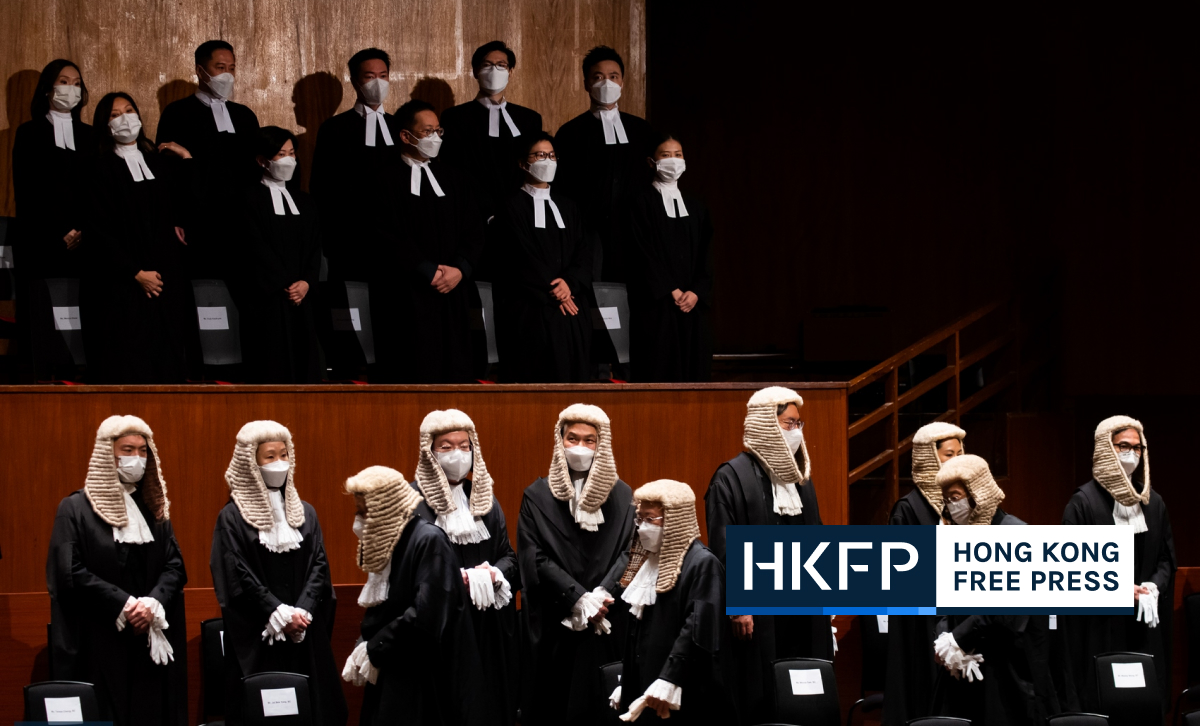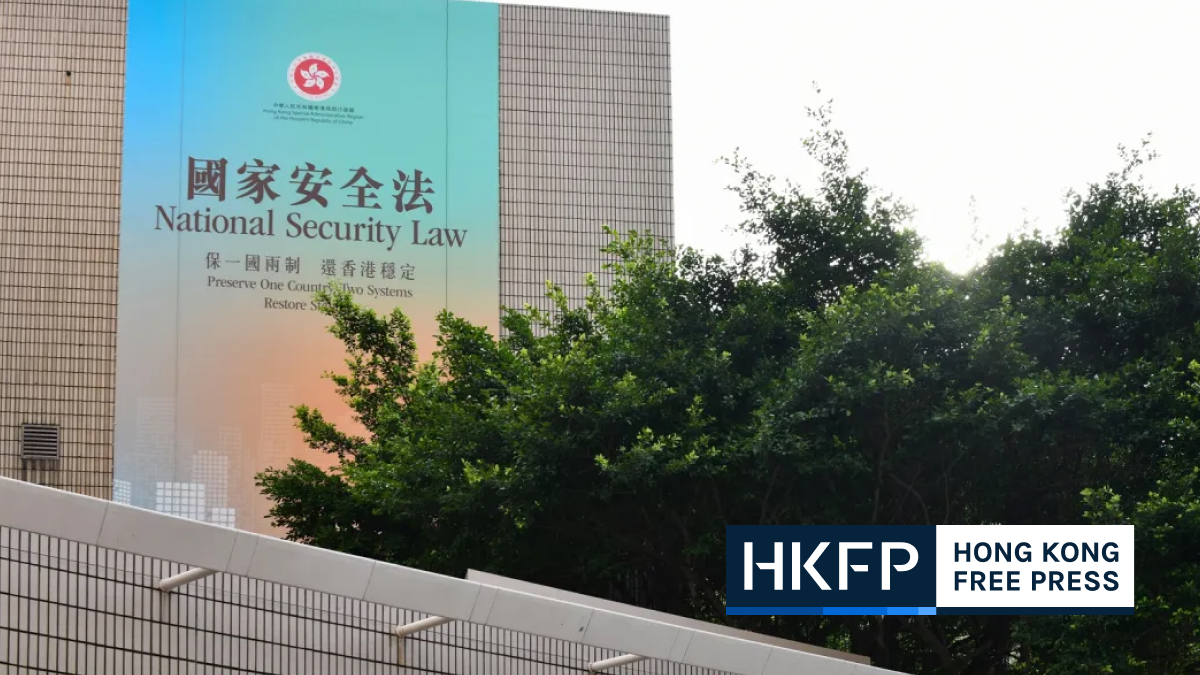Four years on from the 2019 protests and unrest, Hong Kong is seeking to ban unlawful acts linked to the movement’s anthem, Glory to Hong Kong – a move that its composer foresaw back in 2020. But why is the song controversial, and where did it come from? Is the city sleepwalking into enacting mainland China-style internet controls? And is the song already illegal anyway?

HKFP examines how the government has sought a ban, and why.
Where did the song come from?
Glory to Hong Kong was released on YouTube by a local songwriter named Thomas, and his team, on August 31, 2019 – during the height of the citywide pro-democracy demonstrations and unrest. It featured lyrics co-written by users of online discussion forum LIHKG. They called for democracy and freedom, and included the now-banned protest slogan: “Liberate Hong Kong, revolution of our times.”
“For all our tears on our land, do you feel the rage in our cries,” the lyrics say. “Rise up and speak up, our voice echoes, freedom shall shine upon us.”
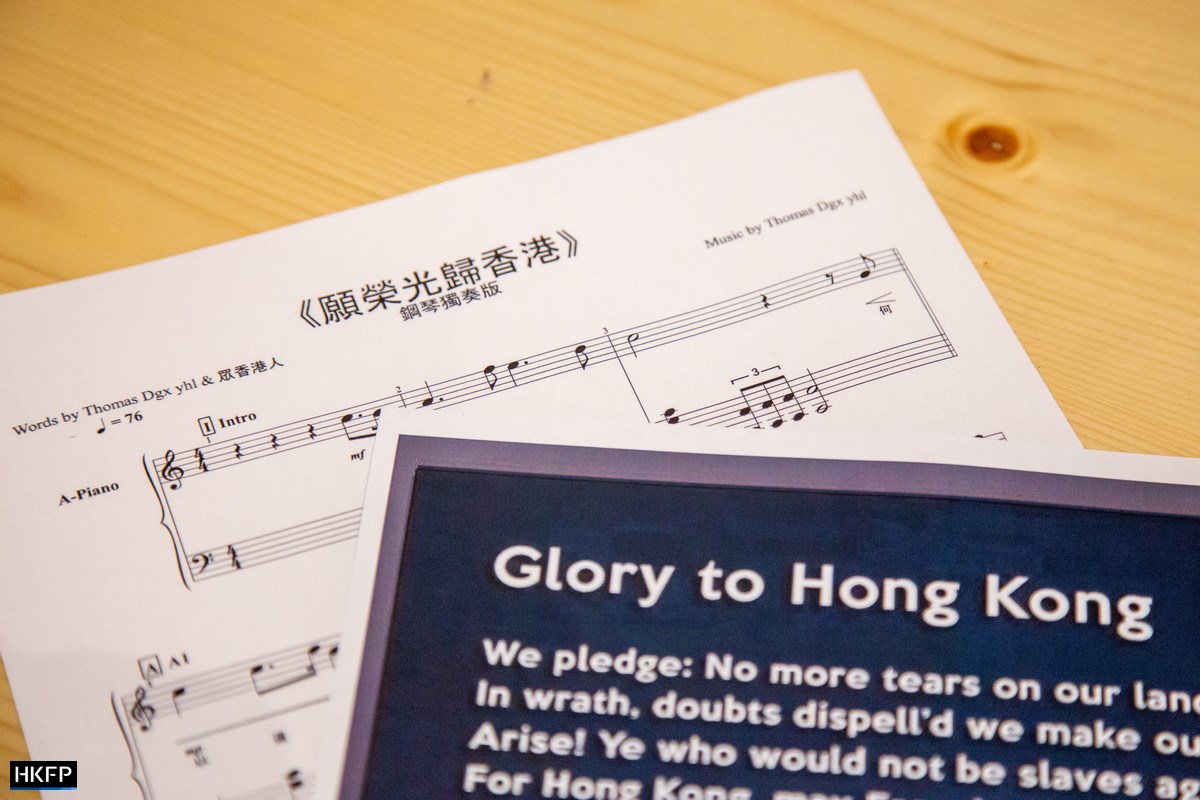
Ten days later, the song’s popularity skyrocketed when football fans belted it out during a match between Hong Kong and Iran, after booing the Chinese national anthem. In the months that followed, it was often played on loop during street demonstrations, or formed part of mass “Sing With You” gatherings at shopping malls.
This mall singalongs were favoured by “wo lei fei” – people who preferred peaceful means of fighting for civil rights, as opposed to the vandalism and violence which gripped parts of the anti-extradition law movement.

In addition to the scrapping of an extradition treaty with China, demonstrators demanded full democracy, an independent probe into police conduct, amnesty for those arrested, and a halt to the characterisation of protests as “riots.”
Is Glory to Hong Kong illegal?
The government has refused to say whether Glory to Hong Kong is illegal when asked by HKFP, despite the authorities’ insistence that the law is clear. Nevertheless, there have been legal moves and arrests linked to the anthem.
Hong Kong’s national anthem law, which criminalises insults to March of the Volunteers, was enacted on June 4, 2020 – violators risk fines of up to HK$50,000 or three years in prison.
On Thursday, Cheng Wing-chun was jailed for three months after becoming the first person to stand trial under the new anthem law. Cheng replaced China’s national anthem with an instrumental version of Glory to Hong Kong in a video showing Hong Kong fencer Edgar Cheung receiving a gold medal in the Olympics in 2021, making it the first court ruling related to the protest anthem.
Soon after Beijing inserted a national security legislation into Hong Kong’s mini-constitution on June 30, 2020 – which criminalised subversion, secession, foreign collusion and terrorism – the government .
Days later, the government said the 2019 protest movement’s “Liberate Hong Kong” slogan had pro-independence meanings, a crime under the security law, despite the fact that independence was never a demand of the 2019 movement. During the city’s first national security trial a year later the court ruled that the “Liberate Hong Kong” slogan was capable of inciting others to commit secession.
On July 8, 2020, a little over a week after the national security law was enacted, the Education Bureau banned students from playing, singing or broadcasting Glory to Hong Kong on campuses, saying it contained “strong political messages” and was closely linked to violence and other illegal acts.
No-one in Hong Kong schools should “hold any activities to express their political stance,” the education chief said at the time.
In the years since the protests, buskers known for singing the song have been arrested for “public disorder” or targeted for performing without a permit. One was cleared of wrongdoing, whilst another’s trial is still ongoing.
Another man was arrested for suspected “sedition” last year after sharing a video linked to the song.
When pressed by HKFP over the legality of the protest anthem in October 2020, a police spokesperson was unable to give a clear answer: “Every case will be handled having regard to all the relevant circumstances, which include the facts, conduct, intent, as well as the evidence gathered, and in accordance with relevant laws.”
How might Glory to Hong Kong be banned?
On June 5 this year, the government submitted a writ seeking to ban the “broadcasting, performing, printing, publishing, selling, offering for sale, distributing, disseminating, displaying or reproducing [Glory to Hong Kong],” including on the internet, with a secessionist or seditious intent, or with the intent to violate the national anthem law. Anyone who assisted others to commit such acts would also be liable.
The Department of Justice’s legal bid for an injunction and interim injunction came days after a busker, known for performing the song, was cleared of wrongdoing.
On June 12, the Court of First Instance adjourned the injunction hearing until Friday, as the authorities appealed for anyone with an objection to come forward.
The Hong Kong Journalists Association sought an exemption from the injunction for journalists reporting on matters related to Glory to Hong Kong if it is granted. On Tuesday, the press group said that the Department of Justice had “informed the court that it agreed to an HKJA proposal to include an express exemption for journalistic activity… if its injunction application is to be granted.”
“This provides protection for the freedom of the press and the freedom of speech in clear terms, both of which are guaranteed constitutional rights in Hong Kong,” the HKJA said.

During the hearing for the injunction application on Friday, Senior Counsel Abraham Chan presented opposing arguments, including that by seeking to prohibit unlawful acts relating to Glory to Hong Kong, it had only drawn attention to the song. The injunction application, Chan said, “would bring about an own goal” and risk the “Streisand effect.”
Additionally, Chan said that the acts listed under the injunction – broadcasting the song with a seditious or secessionist intent, or with the intent to violate the national anthem law – were already covered under the Crimes Ordinance, the national security law and legislation banning insults to the March of the Volunteers.
The ruling is expected to be handed down on July 28.
Why was it confused with the national anthem?
Many pro-democracy protesters viewed the song as an alternative or potential anthem for Hong Kong, and – in the years that followed – it has been confused with the city’s actual national anthem, which is that of mainland China.
A months-long series of mix-ups began last November, when Glory to Hong Kong was played at a Rugby Sevens game in South Korea after an intern reportedly downloaded it from the internet. Whilst the Hong Kong government demanded a “full investigation,” one Hong Kong lawmaker even demanded the person responsible be extradited to the city.

“The National Anthem is a symbol of our country,” a government spokesman said in response. “The organiser of the tournament has a duty to ensure that the National Anthem receives the respect it warranted.”
Meanwhile, the Hong Kong Rugby Union (HKRU) said in a statement: “The HKRU expressed its extreme dissatisfaction at this occurrence and has received a full explanation of the circumstances that led to this. Whilst we accept this was a case of human error it was nevertheless not acceptable.”
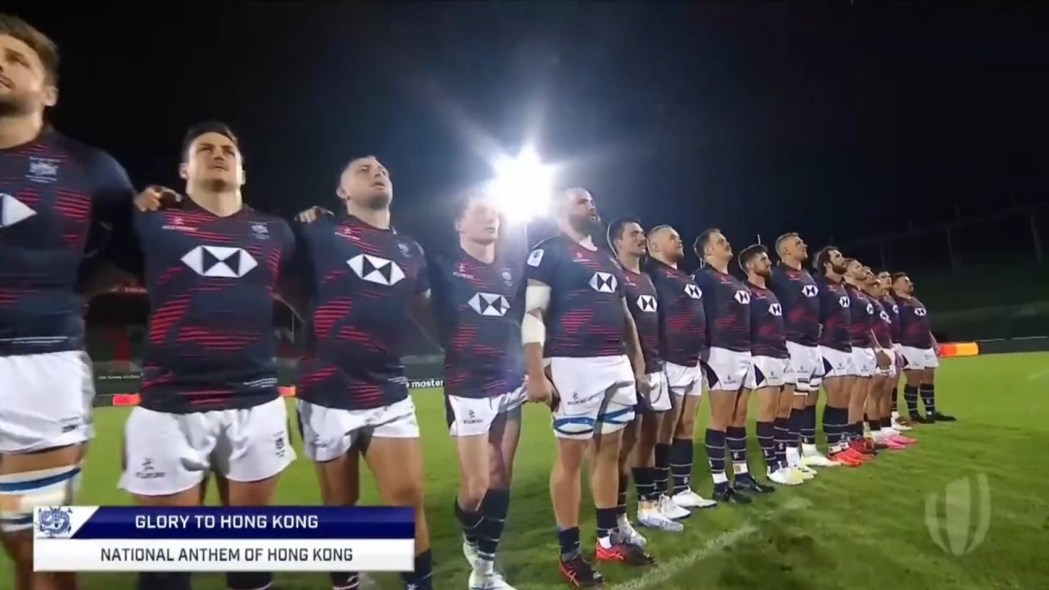
In the weeks that followed, two instances of Glory to Hong Kong being mislabelled as the “national anthem of Hong Kong” occurred in televised footage at other rugby events. It led to sporting authorities issuing guidelines to ensure athletes made a “time out” gesture if the offending song was played.
Just weeks later, another anthem blunder occurred at the Asian Classic Powerlifting Championship in Dubai. Last December 3, local gold medallist Susanna Lin made the “time out” signal as the protest anthem was played during her prize-giving ceremony.
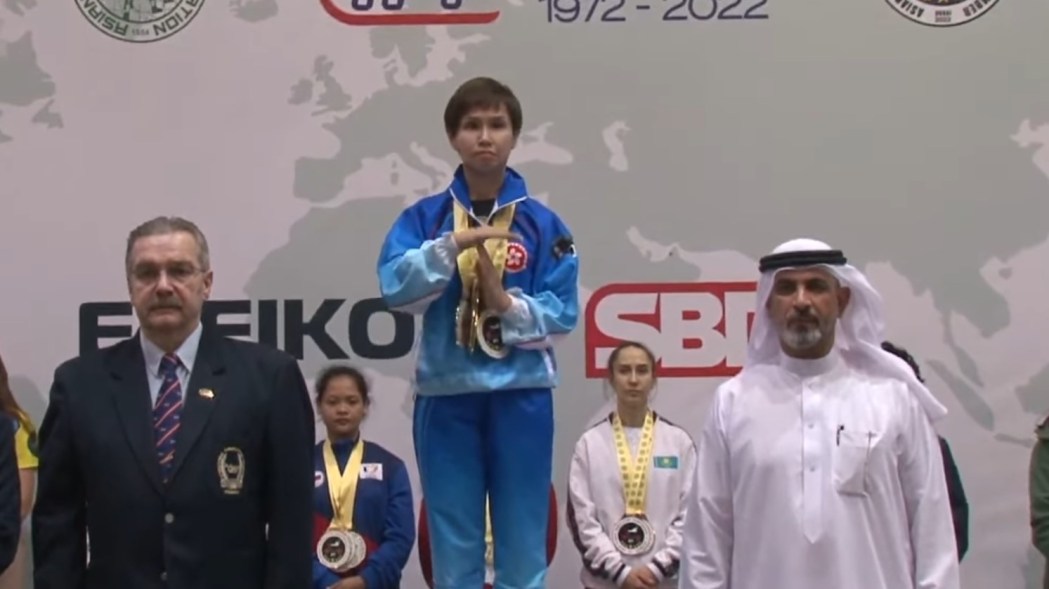
A Hong Kong sports official rejected an apology from organisers, and the Organized Crime and Triad Bureau launched a probe.
Yet another mix-up occurred in February at an ice hockey game in Bosnia and Herzegovina. Several Hong Kong hockey players at the World Championship Division III Group B match made the “time out” gesture as the offending song was played following their victory over Iran. The audio was halted and the correct anthem was played after around 90 seconds.

Local sports associations now have to collect an anthem toolkit from the Sports Federation & Olympic Committee of Hong Kong, China each time they set off for an international sports event. It contains two regional flags, two hard copies of the anthem – either computer disks or a USB drive – as well as an acknowledgement receipt for event organisers to sign.
Meanwhile, guidelines have been tightened further, with sports teams now expected to boycott any event in which the anthem cannot be inspected in advance.
Why is Google in trouble?
The government and state-backed media eventually pointed the finger at search giant Google, after investigations concluded that sporting event staff had downloaded what they believed to be the city’s anthem from the internet.
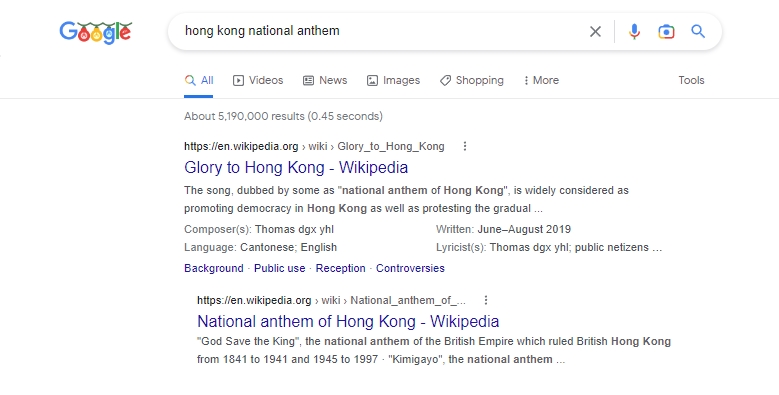
Until recently, search results for “Hong Kong national anthem” would often list the Wikipedia page for Glory to Hong Kong at the top, prompting protests from the local authorities.
Last December, top officials – including Chief Executive John Lee and security chief Chris Tang – criticised the US firm after it failed to comply with a government request to change the search results.

According to Tang, Google said their results were generated by an algorithm with no human intervention: “We have approached Google to request that they put the correct national anthem at the top of their search results, but unfortunately Google refused… We felt great regret and this has hurt the feelings of Hong Kong people.”
Tang said that Google provided paid advertising services to allow specific results to appear in prominent places. He also added that Google faced a European Union legal ruling requiring it to remove incorrect search results from its site.
With the tech firm refusing to budge, the government updated its English-language web page with anthem details in April, months after the anthem row erupted. Since then, it has appeared as the top search result, when checked by HKFP.
Google has previously vowed to decline data requests made under the security law, and left China amid rising internet censorship in 2010. It has not responded to requests for comment.

Earlier this month, Secretary for Innovation, Technology and Industry Sun Dong told Now TV that the injunction had been applied for after Google did not accede to requests to remove Glory to Hong Kong from its search results.
“Google said you must have evidence to prove that [the song] violated local laws, that [we] needed a court order,” Sun said. “Very well, since you brought up a legal issue, let’s use legal means to solve the problem.”
Is the song still available?
The song remained widely available online until news of the plan to ban it emerged. In the days that followed, it ended up dominating the Apple iTunes Top 10 for Hong Kong, before the composer – Thomas – temporarily removed it from some streaming platforms.
| iTunes chart position | Movement | Artist and title |
|---|---|---|
| 1 | +2 | Thomas DGX YHL – 願榮光歸香港 |
| 2 | +6 | Thomas DGX YHL – 願榮光歸香港 (進行曲) |
| 3 | +17 | Thomas DGX YHL – 願榮光歸香港 (純音樂) |
| 4 | New entry | Thomas DGX YHL – Glory to Hong Kong |
| 5 | +28 | Thomas DGX YHL – 願榮光歸香港 (聖光版) |
| 6 | +100 | Thomas DGX YHL – 願榮光歸香港 (純樂器版) |
| 7 | +92 | Thomas DGX YHL – Glory to Hong Kong |
| 8 | New entry | Thomas DGX YHL – Glory to Hong Kong (Luminous) |
| 9 | New entry | The Chairman – Glory to Hong Kong! |
Thomas told HKFP that he was unable to explicitly explain the song’s apparent disappearance. But in a Facebook post on June 19, he said that a new, 2023 album of songs – including Glory to Hong Kong and three new tracks – had been reshared on various platforms.
“I resolutely oppose any behaviour that attempts to curb freedom of thought and speech,” he wrote. “I really understand everyone’s view that they ‘do not want to lose the freedom of choosing music either.’ Despite facing different difficulties, I still want to defend this aspiration.”
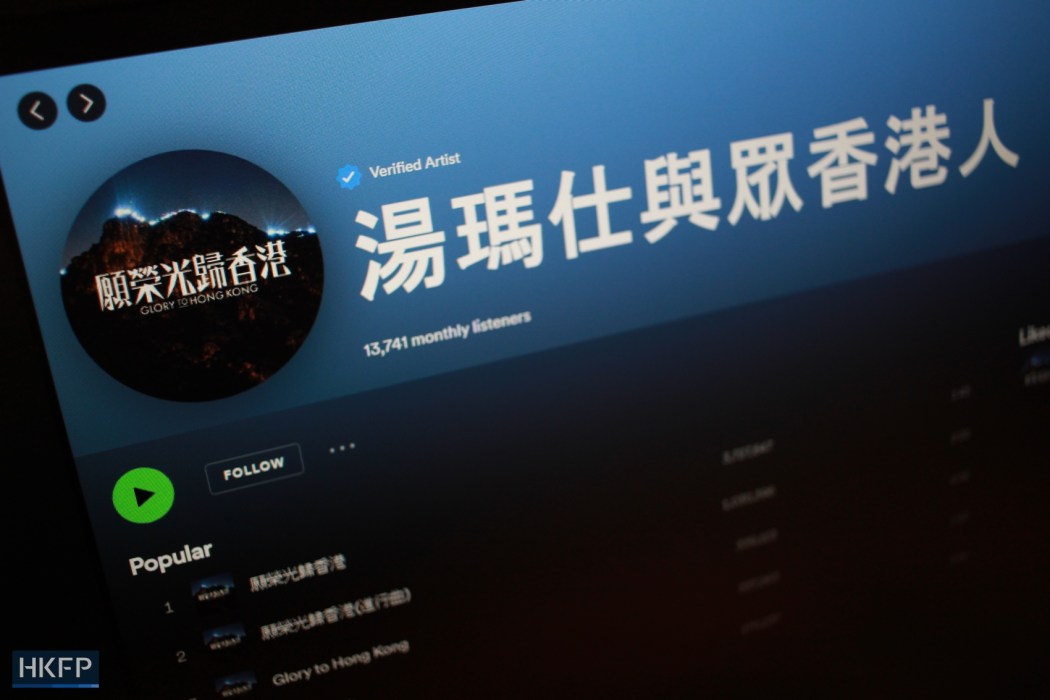
The song officially reappeared on Spotify and Taiwanese platform KKBox, but remains missing from Apple Music. Reuters reported that versions on Facebook and Instagram had also vanished, though versions remain on YouTube, Twitter and Soundcloud.
The original video for the song had been made “private” as of June 21, according to a check by HKFP.
What do tech and telecom firms say?
Meta, Google, KKBox, Apple, Soundcloud and other streaming platforms did not respond to HKFP’s earlier requests for comment, whilst Twitter auto-responded to enquiries with a “poop” emoji.
Though Google has been repeatedly targeted in the local state-backed press throughout the sage, a data scientist told HKFP in June that it was too early to tell if a total ban would lead it, or other tech firms, withdrawing their services from the city.
The Business and Professionals Federation of Hong Kong has been among those objecting to the city’s moves to ban certain books and songs, raising concerns that it may affect Hong Kong’s reputation as a business hub.
What does the composer say?
In a 2020 interview, composer Thomas told HKFP that he thought a ban was inevitable: “We had anticipated that the government would be that unreasonable and suppress citizens’ voices, by fair means or foul… Maybe it will go more underground, but it will not disappear completely. I think everyone will remember this song.”
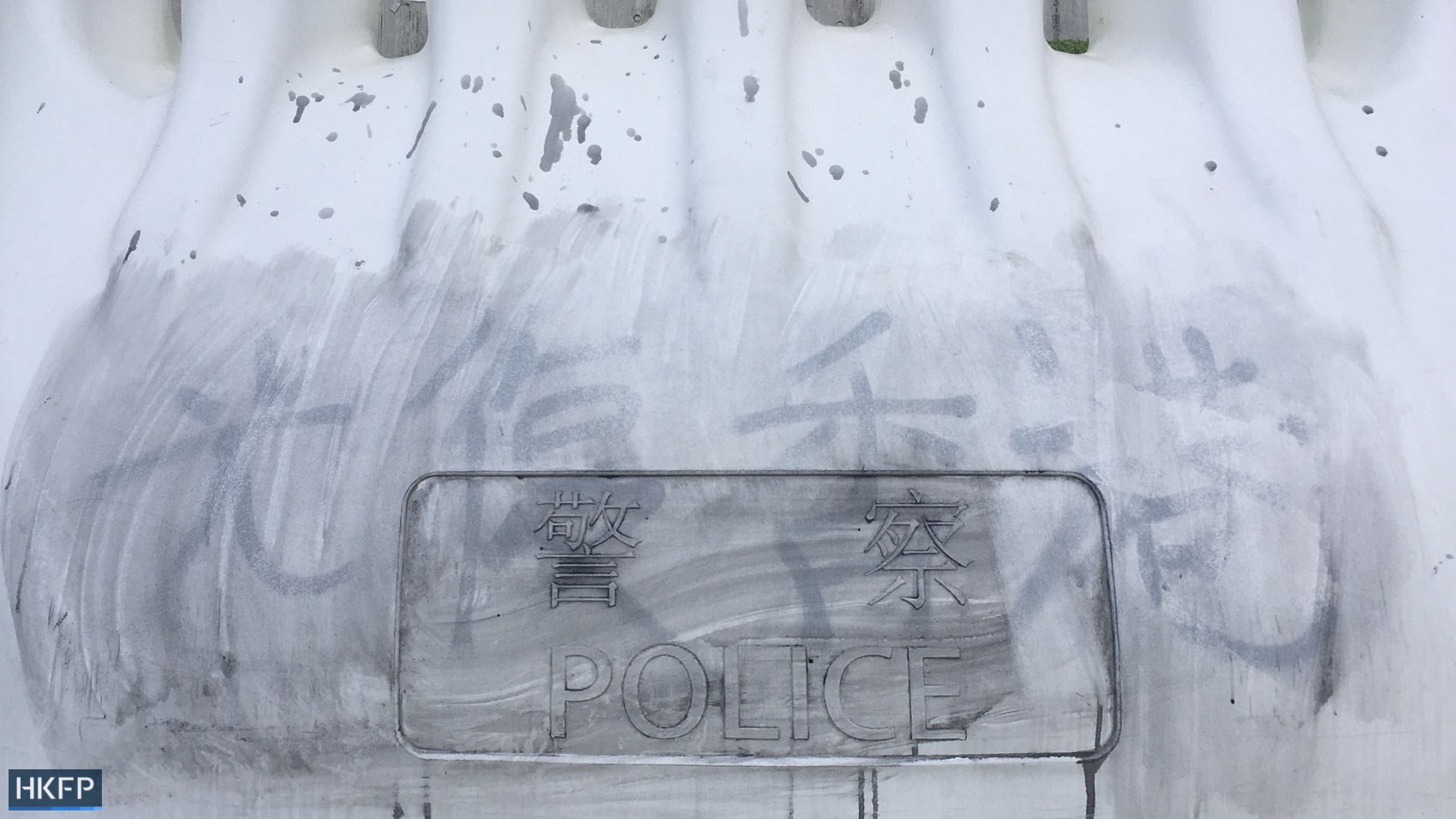
He added that people would not back down easily in the face of what he called an “unreasonable request.”
Support HKFP | Policies & Ethics | Error/typo? | Contact Us | Newsletter | Transparency & Annual Report | Apps















